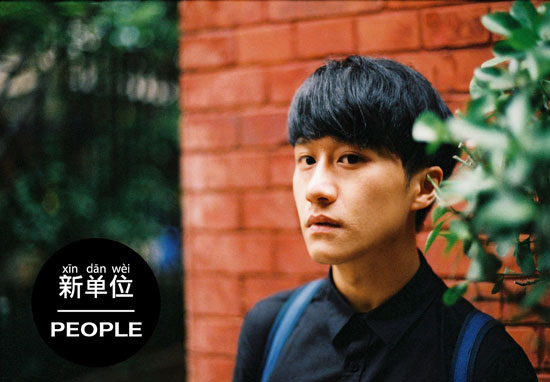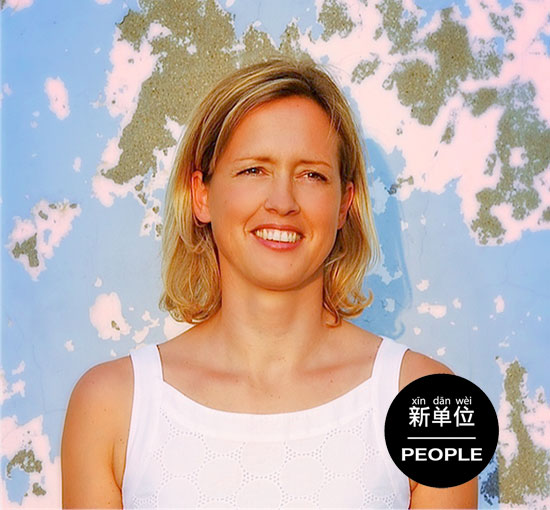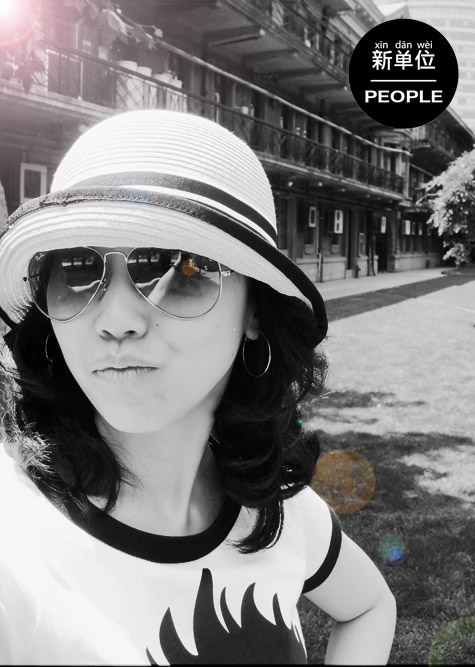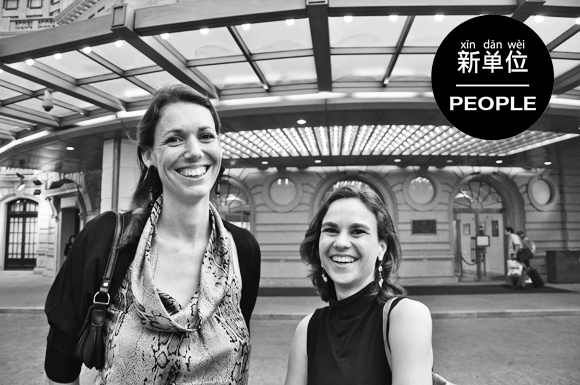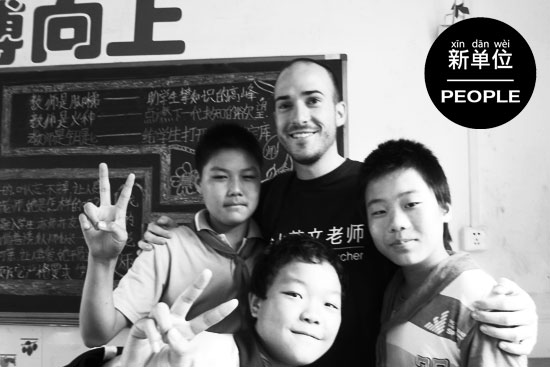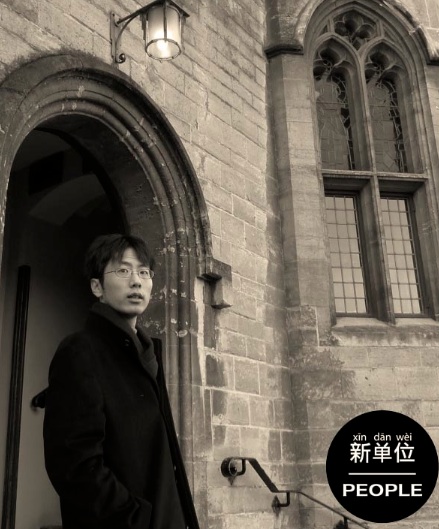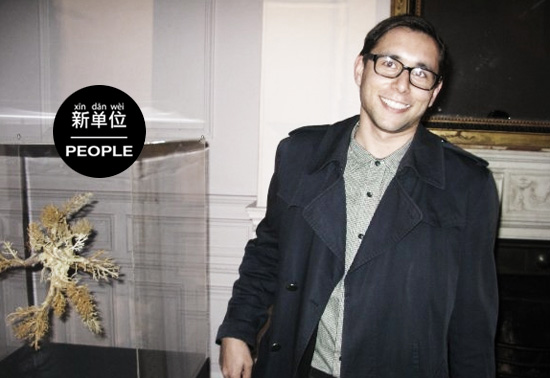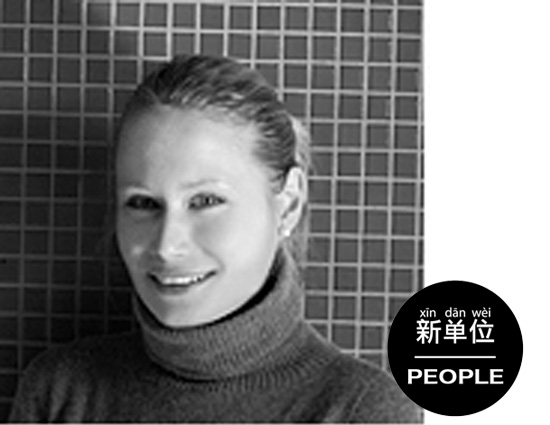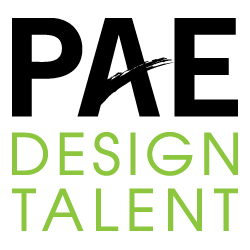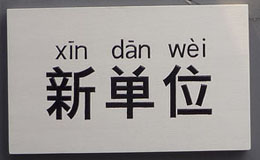
[lang_en]August Featured People: Christina Lamontagne
Interview & Translation / Zhang Yuan
For this month’s PEOPLE we are delighted to introduce you to Christina LaMontagne,an early-stage investor for innovation in health and environmental sustainability. Her worldwide vison and ambiton impresses us as well the passion for China. When she was young, she developed expertise in HIV/AIDS prevention in China and other countries. Let’s have a word with this “China hand” on what she thinks of her career.
1. Hi Christina, let’s start with your past adventure first. As a Fulbright Scholar, you spent three years working across the public and private health care systems in China, and helped design and finance the Chinese government’s $67MHIV/AIDS treatment program for southwest China. How was this experience? And what was your discovery?
It was a privilege to win a Fulbright Scholarship, which has a mission to enhance inter-cultural exchange. My work with the Chinese government built upon research I did as an undergraduate at Dartmouth College. I worked for the International Cooperation division of the Chinese Center for Disease Control. I was the only foreigner in the office, so I had a great opportunity to learn from my Chinese colleagues and we bonded over games of ping pong and lots of cafeteria meals.
2 Could you tell us your personal experience working with the Chinese government in the HIV/AIDS treatment program? What was the major difficulty you had encountered? And have you heard anything from the program after you left?
I came to China to work on HIV/AIDS immediately following the SARS and Avian Flu epidemics in 2003. Prior to 2003, the Chinese government took a private, national approach to HIV/AIDS prevention and treatment. However, after the public health events of 2003, China invited collaboration with the WHO, UN, Clinton Foundation and other international organizations. You could say that as a young foreigner, I was in the right place at the right time.
In 2003, HIV/AIDS was still a very sensitive topic for many Chinese. I learned humility to approach a sensitive topic beyond my own cultural borders, teamwork to find novel ways to reach a shared goal, and appreciation for the Chinese way of doing things.
The project was approved by the Global Fund for TB, AIDS and Malaria in 2004 and was implemented in 2005 for a 5 year duration.
3 What brought you to work for HIV/AIDS policy and prevention in China? And why China?
From the time I was 14 or 15 I had a passion for HIV/AIDS prevention and a passion for China. My high school summer job was to help plan social events for people with HIV/AIDS in my hometown of Schenectady, NY. When I got to college, I started to read about how HIV/AIDS was spreading in China through the blood supply. At the time, I was studying Mandarin and I wondered if I could help somehow. In college I interned at the United National Development Program in Beijing and did my own field research around college students’ attitudes toward HIV/AIDS. When I finished college it felt natural to continue to work in this area.
4 Now you are currently working for Physic Ventures, can you explain a little about it? What is it? Who is it for? What do you do for it?
Physic Ventures in a venture capital firm based in San Francisco. We invest in health and environmental sustainability start-ups companies. I work hard to find the best start-ups with the highest potential to improve health and the environment. Then I research the market potential, leadership team, and business model of these companies and decide whether to invest. Physic Ventures usually looks at 1200 companies per year, but we only make about 4 investments each year – so it is tough work to find the best companies! After we make an investment, we help the companies to grow and to reach their full potential.
5 What led you in your career from an expert in HIV/AIDS prevention to a venture company investor?
After a few years of working on HIV/AIDS, I started to think about broader health issues globally and in the US. I decided to commit my career to trying to improve healthcare. When I went to get my MBA, I took every healthcare industry class available to me. I learned about the role of innovative companies in improving healthcare, and then I learned about the role of venture capitalists who took huge risks to ultimately bring new health products and services to market. Without these venture capitalists, many drugs, devices, and health technologies would have stayed in the medical lab, never really helping anyone. I have always been a curious person interested in changing the world – so I thought this would be a good job for me.
6 What do you think of the world today? Are you an optimist or pessimist as 2012 is coming real soon? And how you see the role of high-tech for changing our environment?
I am an optimist, although I see real troubles right now in my home country (the USA). Unfortunately we have been struggling with economic and political challenges for many years—but I still believe in the American dream and think the US has a unique culture which promotes a combination of innovation, meritocracy and cooperation that is hard to find elsewhere. I see China as a country with a great future and so much potential ahead. I first came to China in 1995, and it’s been one the greatest privileges of my life to see China evolve over the last 16 years.
One of the things I am looking forward to is a time when technology from China, India, and other emerging economies spreads more rapidly and comprehensively to the rest of the world. With the resources China has in terms of education, human talent, and cost structure, I see China as a sponsor of more and more innovation over time. For example, China’s mobile market is so large — sooner rather than later Apple and other US companies will take cues and build global strategy around what they learn in China.
As an investor and as an individual interested in China, I’m excited for this change to take place and I want to be a part of sharing Chinese innovation with the rest of the world.
7 Let’s talk a bit about Xindanwei. Why you choose here as your working space?
I looked at several corporate office rental for corporations but found them to lack the social aspect of XDW. From my perspective, business is often about relationships and learning from friends and colleagues. As I have limited time in China, I want to meet as many people as possible. A shared workspace like XDW offers so much more than a basic office rental where I might shut my door and never meet and learn from anyone near me!
Additionally, coming from San Francisco/Silicon Valley and working as an early-stage investor, I’m very familiar with the incubator model. Working at XDW with other creative and entrepreneurial minded people just feels more natural and authentic. 
8 Anything else to tell our readers?
Through XDW, I hope to meet more people who are passionate about international business. In particular, I am interested in innovations from China that could benefit people around the world. There is such an opportunity ahead of us to share Chinese innovation and culture with the rest of the world. I often see more similarities between Shanghai and New York than I see between New York and Des Moines, Iowa or Between Beijing and Lhasa. Why not build a company together that targets the new generation in these global cities?
Review:
During the interview, I can not help having the feeling that our interviewee has a lucky streak, as things are always coming to her at the right time and the right place. It is lucky that one knows what his or her passion is at an early age, isn’t it? She agrees, but says it comes with a bit dedication and preparation. What do you think, guys? By the way, apart from working at Physic Ventures, Christina also has an interest in making her own personal investments. If you have some remarkable idea or innovation and wish to work with her, don’t wait! But bring a bit of dedication and preparation.
Bio
Christina LaMontagne is an early-stage investor at Physic Ventures, where she works across the firm’s interests in health and environmental sustainability and advises portfolio companies GoodGuide and Gazelle. She is particularly interested in web and mobile-enabled solutions for changing environmental and health-related behaviors. Christina’s professional experience spans marketing, strategy, operations and public policy. At Pfizer, Christina developed direct-to-consumer marketing strategies for a $700M brand. At Oliver Wyman, Christina was a strategy consultant to multi-national healthcare, consumer, and IT corporations both in the US and in China. Christina began her career in China, where as a Fulbright Scholar she helped design and finance the Chinese government’s $67M HIV/AIDS treatment program for southwest China. Christina holds an MBA from Harvard Business School and a BA with high honors from Dartmouth College, where she studied Mandarin Chinese.
About Physic Ventures:
http://www.physicventures.com/
About Fulbright Scholarship:
http://us.fulbrightonline.org/about.html
To Contact Christina LaMontagne:
christina.lamontagne@gmail.com[/lang_en]
[lang_cn]人物(八月):Christina LaMontagne
采访和翻译/Zhang Yuan
本期人物向大家介绍我们的长期客户Christina LaMontagne,这是一位乐观积极,有心想做些事来改变世界的人,她去过很多地方,但对中国情有独钟,能说一口很溜的中文。从一位艾滋病防治方面的专家到一个健康与环保领域内的风险投资人,她丰富的工作经历、国际化的商业视野还有曲折而坚定的人生追求更是激起了我们对她的浓厚兴趣。让我们来好好认识一下这位中国通:
1 你好,克里斯提娜,让我们先来聊聊你过去的一些不平凡的经历吧。作为一名获得富布赖特奖学金的学者,你曾用三年时间在中国各公立及私有医疗康复系统里工作,成功帮助中国政府设计并协助融资一个在中国西南地区规模达到六千七百万美元的HIV病毒/AIDS艾滋病的防治项目。和我们谈谈这次经历吧,有什么收获和发现?
获得富布赖特奖学金是一项特殊的荣誉,这项奖金旨在推动各地的跨文化交流。我和中国政府的合作起于我在达特茅斯大学读本科时所做的研究。后来我去了中国疾病控制中心国际合作部工作。当时我是整个办公室里唯一的老外,于是我有很多机会向我的中国同事学习,我们一起打乒乓,吃饭喝咖啡和聊天,通过这些活动我们建立了彼此的联系。
2 请谈谈你和中国政府工作时的一些个人经历?遇到过比较困难的事么?你离开后这个项目进行得怎样?
我在2003年SARS和禽流感病毒刚过去就来到中国从事艾滋病的研究和防治工作。在这之前,中国政府针对艾滋病的防御和治疗采取的措施并不公开,而且仅限于使用本国的力量。但是经过了2003年一连串的公共健康事件后,中国开始邀请国际组织一起开展合作,比如WHO(世界卫生阻止)、联合国、克林顿基金会等。可以这么说,作为一名年轻的外国人,我在正确的时候来到了一个正确的地方。
2003年,HIV病毒和艾滋病对于大多数中国人来说还是一个非常敏感的话题。为此我学会了放低姿态,以谦逊的态度进入探讨一个敏感的话题,从而超越了自己身上的文化界线,并通过团队合作找到新的方式以达到共有的目标,在这些过程中我学会了欣赏中国人做事方式中的优点。
这个项目的申请在2004年获得了全球防治结核病、艾滋和疟疾基金会的批准,从2005年开始执行,连续五年。
3 什么原因让你投身于HIV病毒和艾滋病的防治工作?为什么选择中国?
自从十四、五岁起,我就有意致力于艾滋病的防治工作,同时对于中国这个国家充满兴趣和热情。当时在我的家乡,位于纽约州的施奈塔迪(Schenectady),我的高中暑期实习就是为当地感染了HIV和艾滋病病毒的人策划和组织有关的社交活动。后来我在读大学的时候,开始了解到HIV和艾滋病毒是怎么在中国通过血液供给传播开的。当时我正在学习中文,于是就想也许自己可以做点什么。大学期间,我去了在北京的联合国发展项目部实习,那段时间里我完成了自己的实地调查,从中了解到大学生这个群体对于艾滋病的态度。所以到了大学毕业,很自然地我继续留在了这个领域。
4 现在你在Physic Ventures公司工作,可以为我们简单介绍一下这家公司么?公司的经营范围?主要的客户有哪些?还有你的具体工作?
Physic Venture是一家总部在旧金山的风险投资公司。我们对在健康和环保领域内的新兴创业企业进行投资。我主要致力于发现在提高和改善健康与环境方面有着最高潜在价值的创新企业。然后我需要研究这些企业的市场潜力、团队的领导力以及它们的商业模式,从而决定是否投资。公司通常情况下每年会找1200家企业进行观察,但经过筛选只有4个企业最终可以获得我们的投资,所以要找到最好的公司并非易事!我们在做出投资后,会继续帮助这些企业成长发展达到它们的最大潜力。
5 那你又是怎么会想到从一位艾滋病防治领域的专家变成一名风险投资人的?
在从事艾滋病的防治与研究工作几年后,我开始思考全球以及美国国内更加广泛意义上的健康问题。于是我决定投身到提高世界健康与卫生的事业中。在学习MBA的时候,凡是涉及这个产业的课,我都会去听。从中我认识到创新企业在提高和改善健康卫生方面的作用,接着我又了解到风险投资人是怎样冒着巨大的风险,把新的健康产品与服务最终带到我们的市场。如果没有这些风投,很多药物、设备和健康技术将呆在实验室里,永远没法帮助到任何人。而我一直都是一个充满好奇心的人,想着怎么可以改变(善)这个世界,所以我认为这是一份很适合我的工作。
6 你是怎么看今天这个世界的?2012就在眼前,你是乐观还是悲观?对于高科技在改变我们环境上起的作用,你的观点是什么?
我是一个乐观主义者,尽管目前我在自己的祖国(美国)看到了确确实实的困难。很不幸,多年来我们一直和来自经济与政治上的挑战奋力搏斗,但我始终相信我们的美国梦,在我看来,美国有着自己独特的文化,它推崇创新精神、对人才的尊重以及相互间的合作,这样的文化在其它地方很难找到。对于中国,我认为它的未来和潜力不可估量。我是1995年第一次来到中国,在过去的十六年里我亲眼目睹了这个国家的变化与发展,很荣幸我的人生中有这样的经历。
有一件事我希望可以看到,就是来自中国、印度和其它经济开始展路头角的国家的技术,可以更加快速、更广泛地传到世界各地。由于中国在教育、人才和成本结构上的资源优势,我认为中国会在将来支持和资助越来越多的创新技术。打个比方,中国拥有如此巨大的移动资讯市场,要不了多久,苹果和其它的美国公司就会做出反应,根据它们在中国学到的东西来制定自己的全球战略。
作为一个投资人,一个对中国感兴趣的人,我对将要发生的这些变化感到兴奋,我想参与其中,把中国的创新推广到全世界。
7 让我们来聊聊新单位。你为什么会选择这里作为你的办公地点?
之前我看了不少出租办公室的地方,但是觉得它们都缺少新单位的交流氛围。对于我来说,生意很多是来自你的人脉,从你的朋友和同事身上可以学到很多。我在中国的时间有限,所以我希望尽可能遇到多的人。在一个只出租办公室的地方,我也许把门一关,永远不会认识我身旁的人,也学不到任何东西,相比之下,新单位的共享空间给我的要多得多。
而且,作为一个同时在旧金山硅谷工作的早期投资人,我对孵化模式非常熟悉。在新单位能和其他具有创意思维和创业精神的人一起工作,我觉得如鱼得水,再自然亲切不过。:-)
8 还有什么要和我们的读者一起分享?
通过新单位这个平台,我希望可以认识更多对国际商业有热情的人。尤其要说的是,我对来自中国的可以造福全世界的创新技术感兴趣。这是个非常好的机会,可以把中国的创新技术和服务带到全世界一起分享。相比于纽约和爱荷华州的德梅因(Des Moines),或北京和拉萨,在我看来,上海和纽约之间的相似性要高很多。那为什么不在这些全球性的大都市里,瞄准新的一代人来一起携手创业呢?
采访后记:
在采访的过程中,我会觉得我们的被采访者是个幸运儿,好像她总可以在正确的时候正确的地方去做她想做的事。如果一个人在她很年轻的时候就知道她真正的兴趣和热情所在,这难道不是幸运么?Chtistnina说是,她很幸运,就是这幸运需要那么一点付出和准备。大家觉得呢?顺便说一下,除了在Physic Ventures担任投资人外,她同时也开展自己的私人投资项目。所以如果大家有什么好的想法或创新需要资金,并想和我们的Christina一起工作,那么就快联系她吧!别忘了,带上你的一点付出和准备。
Christina LaMontagne个人履历
Christina LaMontagne在Physic Ventures风险投资公司担任早期投资人的工作,根据公司的价值利益在健康与环境可持续发展领域寻找投资项目,此外还给GoodGuide和Gazelle这样的投资组合公司提供咨询。她尤其对能改变环境还有改变涉及健康方面行为的互联网技术以及应用移动通讯的解决方案感兴趣。Christina在市场营销、战略发展、运营管理以及公共政策方面拥有自己的专业知识和工作经验。在辉瑞公司工作期间,她为一个价值七亿美元的品牌开发了一系列直接面对消费者的营销策略。在Oliver Wyman公司期间,她为很多在美国和中国的跨国企业担任战略顾问,涵盖医疗健康、消费品和IT等产业。Christina的职业生涯起于中国,当时作为一名获得富布赖特奖学金的年轻学者,她成功帮助中国政府设计和融资了一个在西南地区规模有六千七百万美元的HIV病毒和艾滋病防治项目。她在美国的达特茅斯大学(Dartmouth College)取得学士学位,并在那里学习了中文,之后她在哈佛大学商学院获得了MBA文凭。
Physic Ventures的简介:
http://www.physicventures.com/
关于富布赖特奖学金:
http://us.fulbrightonline.org/about.html
联系Christina LaMontagne:
christina.lamontagne@gmail.com[/lang_cn]
